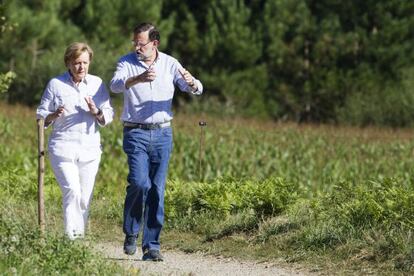Merkel seeks Spanish support for unpopular austerity measures
German chancellor dines with PM Rajoy in Galicia on two-day visit to Spain

German Chancellor Angela Merkel traveled to Spain on Sunday for a two-day trip aimed at securing Spanish support for her austerity policies, now under fire in the European Union.
In return, Spanish Prime Minister Mariano Rajoy is seeking Merkel’s help to place two of his officials in top European positions. Specifically, Rajoy wants former agriculture minister Miguel Arias Cañete to receive a relevant economic portfolio, and current economy minister Luis de Guindos to head the Eurogroup, or gathering of European finance chiefs.
Merkel is currently under pressure from France and Italy to modify the EU’s austerity policies. Italy in particular, under its leftist government, is resisting measures that countries such as the United States reject, and whose results have been the subject of broad debate.
Now, Germany is casting Spain as a role model because of its faithful adoption of austerity measures and significant labor reforms.
Rajoy and Merkel, who speak through interpreters, appeared to be in tune with one another, and covered five kilometers of the Camino de Santiago pilgrimage route on foot together on Sunday. Later, they dined alone at a luxury restaurant in the Galician capital.
But popular sentiment for Merkel's austerity policies is not as supportive as the conservative leader's. Outside the chancellor's hotel in Plaza del Obradoiro, several hundred people gathered to boo her for measures that many Spaniards feel have hurt the economy, rather than helping it.
Government sources said that both leaders will discuss economic policy, growth, energy, immigration and the crisis in Ukraine, among other issues. Merkel arrived in Spain from Kiev, where she previously met with Ukrainian president Petro Poroshenko.
But the same sources admitted that power-sharing is also a key topic of the two-day meeting, which comes just one week ahead of the Brussels gathering that will decide who gets most of the EU’s top executive jobs (except for the Eurogroup, whose president will be decided at a later date).
Despite pressure to put forward a woman’s name, Rajoy is insisting on supporting Arias Cañete for a commissioner’s position, even though his candidate could have problems getting approval from the European Parliament following his statements on sexism, which he later rectified.
In recent years Spain’s power has waned within the EU. Most recently, it lost its position on the executive committee of the European Central Bank, which makes all the relevant decisions on monetary policy.
Tu suscripción se está usando en otro dispositivo
¿Quieres añadir otro usuario a tu suscripción?
Si continúas leyendo en este dispositivo, no se podrá leer en el otro.
FlechaTu suscripción se está usando en otro dispositivo y solo puedes acceder a EL PAÍS desde un dispositivo a la vez.
Si quieres compartir tu cuenta, cambia tu suscripción a la modalidad Premium, así podrás añadir otro usuario. Cada uno accederá con su propia cuenta de email, lo que os permitirá personalizar vuestra experiencia en EL PAÍS.
¿Tienes una suscripción de empresa? Accede aquí para contratar más cuentas.
En el caso de no saber quién está usando tu cuenta, te recomendamos cambiar tu contraseña aquí.
Si decides continuar compartiendo tu cuenta, este mensaje se mostrará en tu dispositivo y en el de la otra persona que está usando tu cuenta de forma indefinida, afectando a tu experiencia de lectura. Puedes consultar aquí los términos y condiciones de la suscripción digital.









































